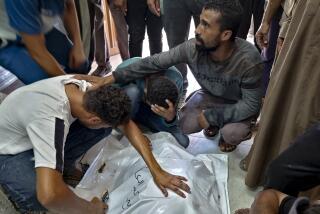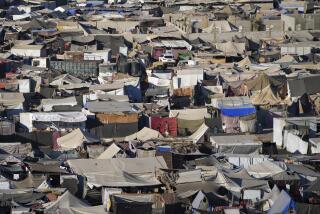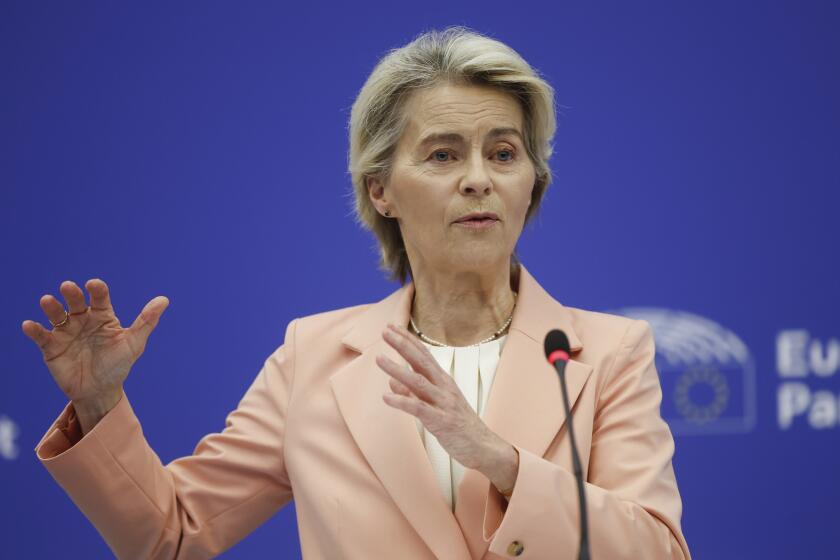Israel, Palestinians head into talks facing same issues as before war
Four weeks after reaching a truce that halted a ruinous 50-day war in the Gaza Strip, Israel and the Palestinians are set to resume indirect negotiations in the Egyptian capital on Tuesday, still seemingly mired in the same disagreements that helped trigger the fighting in the first place.
Hanging over the discussions -- on hiatus since the Aug. 26 Egyptian-mediated cease-fire, which has largely held -- was the threat of a fresh round of fighting unless some longer-term accord can be reached.
Hamas, the dominant power in Gaza, demands the lifting of Israel’s blockade of the coastal enclave; Israel insists that the militant movement, which is sworn to Israel’s destruction, disarm. Another contentious element is expected to be Israel’s rearrest of more than 60 Palestinians freed under an earlier accord, who on Monday announced a hunger strike meant to pressure Palestinian negotiators to make their fate part of any new deal.
The latest round of talks is complicated by tensions between Hamas and rival faction Fatah, led by Palestinian Authority President Mahmoud Abbas. Both Israel and Egypt, which control Gaza’s borders, insist that crossings in and out of the seaside strip must be secured by forces loyal to Abbas.
The Palestinian Authority, ejected from Gaza in 2007 by Hamas, also insists that Abbas be given broad powers in Gaza as the massive task of rebuilding looms. Donors plan to gather next month to discuss the hugely expensive reconstruction effort, but with Hamas at the helm in Gaza, that drive could stall before it begins.
Fatah and Hamas delegations were already in Egypt on Monday and met at Egypt’s intelligence headquarters, the Associated Press reported. The initial parley with Israel, if it stays on track, is expected to be short, because the Jewish holiday of Rosh Hashana begins Wednesday at sundown.
Prior to the fighting between Israel and Hamas that erupted in July, the Palestinians had struck a preliminary arrangement among themselves, under which Abbas would head a government whose writ would extend to Gaza. Hamas had been under heavy pressure prior to the conflict over unpaid salaries for tens of thousands of government workers and members of the security forces, but despite heavy civilian casualties, the fighting actually boosted Hamas’ prestige in the crowded coastal strip.
More than 2,100 Palestinians died during the fighting, together with 72 on the Israeli side, 66 of them soldiers. The United Nations and other human rights groups estimated the majority of the Palestinian dead to be civilians, but the numbers are being fiercely contested in the war’s wake.
Reconstruction of Gaza is expected to take decades and cost billions. More than 100,000 people were left homeless by the fighting, which broke out after relentless rocket fire aimed at Israel by militants inside Gaza. Tensions had risen over the summer after three Israeli teenagers were abducted and killed in the West Bank and a Palestinian boy was kidnapped and tortured to death in apparent retaliation by Jewish ultranationalists.
According to United Nations special Middle East coordinator Robert Serry, last week Israel and the Palestinian Authority agreed on a mechanism for the U.N. and Abbas’ government to monitor the transfer and use of construction materials in Gaza. Serry told the U.N. Security Council that the world body would provide “security assurances” the materials would not be diverted from their civilian purposes, such as Hamas’ construction of an elaborate tunnel network to be used to attack Israel.
Heading into the talks, Israeli leaders appealed directly to the Palestinian populace to not lend political support to more fighting.
“The state of Israel is not at war with the Palestinian people,” Israeli President Reuven Rivlin told diplomats on Monday. “I believe that … if the choice were theirs, they would choose to live in a flourishing country.”
Addressing a post-war conference in Tel Aviv on Sunday, Fatah official Hisham Abdel Razeq, who lives in Gaza, said without broader agreements to change Gazans’ dismal lot, any agreement “would not hold water for very long.”
Special correspondent Sobelman reported from Jerusalem.
Follow @laurakingLAT on Twitter for developments out of the Middle East
More to Read
Sign up for Essential California
The most important California stories and recommendations in your inbox every morning.
You may occasionally receive promotional content from the Los Angeles Times.










